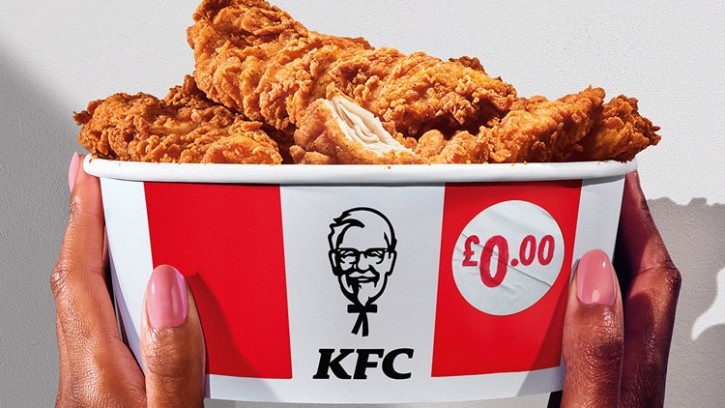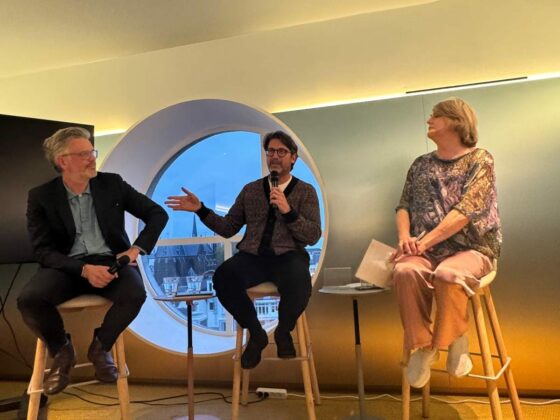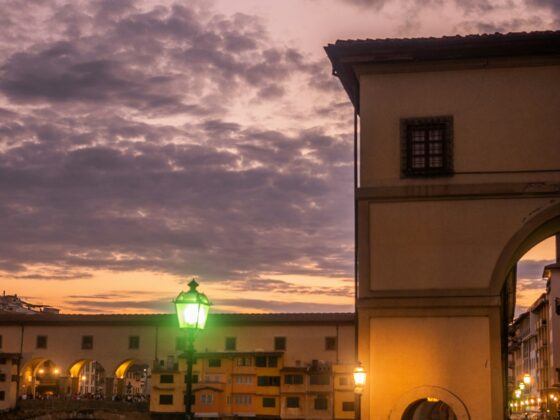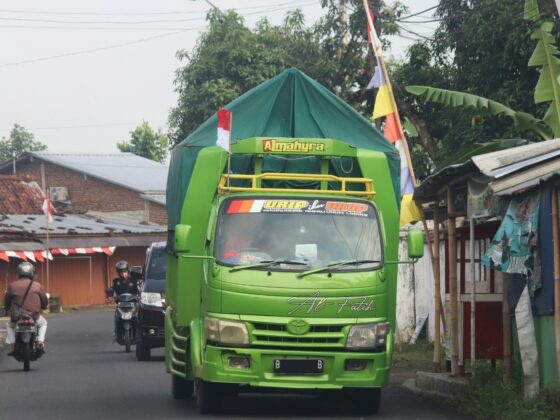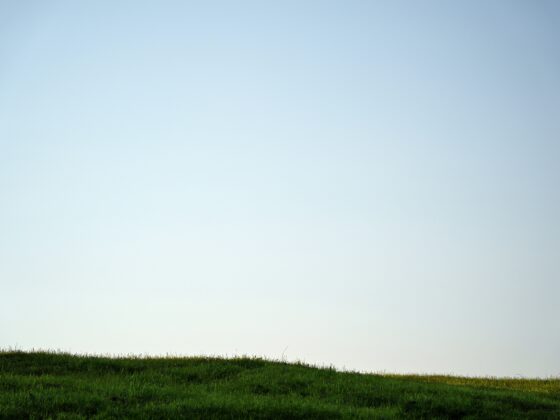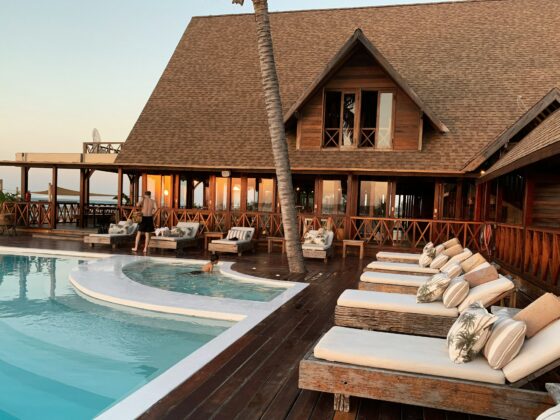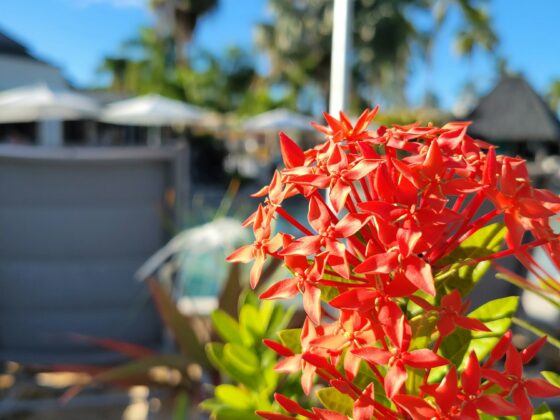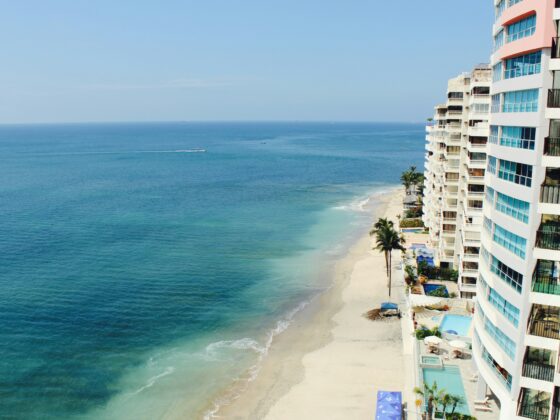Josiah: I’m really interested these days in what it’s like to start out a stay at a place. And especially if the goal is to rest and recharge and maybe you have a busy life at home coming from London, you’re coming from some other city. It’s almost like going through this multiple-hour, very involved, you’re taking the sea tractor experience. I feel like, mentally, it gets you to a place where you can relax more. I don’t know if that resonates with you if you hear that from guests, but I feel like this might be the case.
Penny: Yeah, no, you’re absolutely right, Josiah, it’s totally true. That is what happens. People walk in, and our guest relations team immediately greets them, and they have their glass of champagne, and there’s someone talking to them, and it’s funny, but I honestly think you can see people relax into it and think, Well, I’m here. Everything, you know, it’s like perspective. Everything seems to, you know, like looking through the wrong end of a telescope. All the things that you were worried about when you left are, you know, seen much further away. So yes, I think that being on an island psychologically helps enormously with that relaxation process and sort of speeds it up.
Josiah: Yeah. I wonder, Penny, if you could speak a little bit more about your hotel. You mentioned the Art Deco design, but I’m really interested in the hospitality that you aim to provide. So you have this journey. It’s very thoughtful. You arrive with champagne. I imagine all of these things contribute to feeling like someone can really relax, right? But walk us through, I guess, from that glass of champagne. What happens then for your guests as they experience other aspects of the hotel? What are you doing to help them really relax and recharge while they’re staying with you?
Penny: Well, I mean, it is a big issue nowadays, isn’t it? The mental pressures, mental health and even finding time to relax because time just gets, you know, it just squeezes out that personal time. One of the things that we aim to do is take any responsibility for decisions away. So, when the guest checks in and our guest relations team are looking after them, it’s really all about how they would like their stay to pan out. And as you can imagine, some people just want to sit and read and really relax. No radios. We don’t have tech. We do have radios in the rooms, but we don’t have televisions.
Josiah: Has that always been the case, or is that something that’s intentional to help people disconnect?
Penny: It was it was always intentional to help people disconnect. And it’s very rarely that we get any complaints. So, there was some football match recently, when probably everyone wanted a television, and actually we did provide that, but most of the time it’s the quietness, it’s that rhythmic pulse of the waves in the background. Sometimes it’s the wind that’s also very relaxing. And the air, you know, that smell of seaweed and the saltiness, it just, I think, and it’s probably the ozone. People really do seem to wind down quite quickly. And we do, we try and You know, something needs to happen for people who are, needs to be happening for people who are around the public areas, who are not, you know, in their rooms resting or reading or whatever. So, historically, guests dress up for the ballroom experience. We say black tie, but honestly, the majority of the time, the women come in their beaded flapper dresses. gentlemen are just so dapper and beautifully dressed, and this live music of some form every evening. The ballroom doors open up, there are double doors, and they open onto a terrace, and the terrace overlooks the sea, as indeed does the ballroom, because if you’re inside you can still see the sea outside. So when it’s weather like it is today, which is beautifully sunny without being overly hot, I can guarantee you there will be dancing outside, under the stars, if people stay up late enough, to the sound of the waves. and 1920s music. It just transports you to another world.
Josiah: Penny, if I could, I want to ask how prescriptive you are about this experience. You mentioned black tie. Do you enforce a dress code? Is it encouraged? Walk us through how you think about that and how you prepare people for experiencing and participating in this.
Penny: Well, of course, first of all, it’s on the website. So it is very clear. And we have images on the website which show people enjoying themselves in the ballroom. And that’s really where the sort of drama or theatre, I suppose, is. But we have a second restaurant, which is Smart Casual. That’s a seafood restaurant, because if you’re on an island, why wouldn’t you have a seafood restaurant? We can catch fresh lobster, you know, in the rocks at the bottom of the cliffs. So that’s a much simpler offering because we want the food to speak for itself because, of course, being so fresh, it is just stunning. So, guests do have those options. And we have the Pilchard, which is our third dining option, which is, I suppose, more rustic, fish and chips, you know, that sort of style, style food. But that has its own atmosphere again. So three very, very different offerings.
Josiah: I appreciate you walking through that because I’m intrigued by this notion of asking things of your guests, right? I think some forms of hospitality are very much catered around show up however you want, do whatever you want, we’ll make anything happen for you. But I was staying at a historic hotel in the middle of the U.S. and 100 years old, and they had a very strict dress code and some elements of what you’re describing. It was kind of a new experience for me, but it does transport you. And I think you mentioned this notion of theater. And maybe there’s an opportunity here to ask something of guests, or at least set this expectation, because you know you are creating a performance here. You want them to be actors almost in that performance.
Penny: Yes, well of course we do have. You may know this Josiah, I don’t know, but we do have quite a number of themed events that go to our Burgh Island Club members first and our regular guests so that they always have the first opportunity to book because we’re now, one is Murder Mystery and that is our most popular and I have to say that is so entertaining. How does it work? Well, when the guests arrive to get their glass of champagne, they have to walk across the taped-marked body or place where the body was found. So already when they walk in, there’s this idea that a murder took place. We then employ some very good actors who manage the process. But the great thing is, and it’s true of all our events, the guests get to meet each other. It’s very convivial. It’s a bit of an old-fashioned word, but it’s very convivial because they talk and they meet and they have a good time together. We have seen so many friendships forged with guests who now only come back to us with each other. So they met here and then it becomes a regular annual, you know, weekend away or week away.
Josiah: So you may have answered this already in that these events get you to move outside of how you normally interact. It may make you more open to interacting. But I wonder if you could speak a little bit more to how you encourage that because I’ve been to many hotels or resorts where there’s maybe a happy hour, they have drinks or wine and cheese, and all the guests are invited, but often you’re still talking to your partner or maybe some people that you came with, and it can feel challenging maybe sometimes to start to kind of meet other people. Is there something about hosting these themed events that are getting your guests to interact with each other more than they might otherwise?
Penny: Well, I think there is, and I know it works, and that is that when our guest relations team, actually we have a director of guest relations who’s been here 16, 17 years, He’s absolutely fantastic. And we also have a Golden Keys head concierge. So we have very experienced and talented people who know how to make this happen. And the way it happens is maybe you’re talking to Mr. and Mrs. Smith on one table, And they mention something that you know is of interest to Mr. and Mrs. Brown on the next table. And there are moments when you can introduce guests to each other or you can make reference. Or the barman, barwoman, you know, our bar staff come out and tell a joke. and then that, I don’t mean to the whole room, I mean, you know, to a couple of tables, and then that they carry on talking together. So, it is that, I mean, we have to be very careful that technically, In terms of our etiquette, it is perfect. But I’ve found over the years that that doesn’t have to preclude friendliness and openness and telling a few jokes. Those two things together are magical.
Josiah: So you mentioned hiring actors for these performances. I have not heard about this from other hoteliers. What else do you do when it comes to these events or these participatory experiences you’re doing for your guests that you’re especially proud of or stands out as different from what others are doing?
Penny: Um, we, we have a summer ball, um, which is 90% booked by regulars. So we, we’ve had to introduce a couple of other events so that we can open up to, you know, people who would like to join the Burr Island Club or who, who, um, are interested in perhaps more, um, events that are more participative. So, um, we do that. We also have a Tom Crocker day in the summer, which is with music, but that’s outside and that’s more to do with the Pilchard because Tom Crocker was the smuggler that was shot in the doorway of the Pilchard many, many years ago. So the, the, there are quite a few things that, um, there are quite a few things that, that we do and we have activities of course. You can go paddle boarding. You can go fishing.
Josiah: You mentioned this guest relations team, and I’m really curious these days of thinking about what does it look like to understand guest preferences before arrival and think about accommodating those, helping people achieve some of the goals they have for their trip or their stay with you. What does that look like for you and your team?
Penny: Yeah, no, that is a really good point. And we do do pre-arrival calls because apart from anything else, we have to check for allergens and, you know, issues with food and various preferences. So we like to spend the time on these prequels just to get to know the guests a little bit. We certainly always find out whether they’re celebrating anything. So birthdays, wedding anniversaries are very popular. People come to celebrate. quite a lot of the time. I don’t think there’s an evening when we don’t have anyone who’s not celebrating anything. I don’t think that would be possible. So we always try and help them enjoy their celebrations somehow. And then it is really probably more when the guest arrives and they have their champagne and they have their arrival conversation with guest relations, so head concierge, that we find out a little bit more about them somehow. And then we can ask preferences. And if, for example, someone consistently has sparkling water, then we record that. So next time we don’t really have to ask or we can just say, your usual, Mr. Smith, sparkling. And of course, that makes people feel special and you know so it should because that’s what we’re trying to do.
Josiah: I wonder, Penny, if we could, just to bring our conversation full circle, we started out the conversation talking about why people come to your hotel. A lot of it is for wellness. They’re looking for a break. So however you define wellness, I’m interested for you, though, either personally or kind of as you’ve been observing guests, I’d be really interested to hear how your perspective on wellness or taking care of yourself, however you want to define it, has evolved over the years and especially into your current role now and some of the things that you offer through the hotel. How are you thinking about wellness these days and thinking about offering it to your guests?
Penny: I mean, for me, personally, I look back and I can remember everything being done by post. So you’d write, you’d get a letter and you’d write a letter back. You could pick up the phone, of course, but you didn’t have email. So everything and you didn’t have mobile and, you know, I mean, all the other, all the other things that have come along with the technological developments recently. So, so now I think, you know, everyone recognizes that life is so much faster. So it’s so demanding. You can have 100 emails in your inbox. How do you answer that in a day and look after your staff and, you know, I mean, any business, forget hospitality. How do people manage? And actually, they cram so much more in. I mean, it can’t be it can’t be good for us, although I recognize that there’s good stress and bad stress. And luckily, I absolutely adore what I do. But of course, that those demands are very. Yeah, they’re very tough to manage and find time for yourself. So, I probably do need to slow down. And I’m absolutely delighted when I see people come to us and say, Oh God, I feel so much better, just two days. and, you know, it’s like a weight has fallen off. And part of it is perspective, but it’s also that freeing up of your mind, you know, the opportunity for the alpha waves to, you know, have a moment with you as well. And I think, you know, creativity is so important as well, you know, that you have that space to even think about something rather than being, reactive all the time to your inbox? Not sure if I answered you there quite Josiah, but it’s how I feel about it.
Josiah: I actually really appreciate that because it’s clear. I mean, we spoke a little bit about some of the specific events and experiences that you offer, but for me, it’s helpful to hear at a high level, you know, why does this matter? And I think when people, what I’m hearing from you and what I’ve heard from our conversation is, you’re making the most of the location you have, the property you have, this historic, beautiful property, the location, somewhat remote, it’s this journey to get to it. But all of these things, you’re making the most of it. And you’re thinking about how do I provide hospitality that is exceptional, but it’s also deeply rooted in the place. I think there’s a lot of power in place. And then your guests then have that space to just read or sleep, if they want to do that, if they want to participate in one of your experiences. they have the opportunity to do that, but you’re, you mentioned kind of the word theater before, but you’re almost creating the stage where people can pursue wellness however they define it in many different ways. So I appreciate you sharing that. I guess the last question I would have for you is, I’m curious about, you know, kind of what gives you hope as you think about the future? We’ve talked about people, wellness, you know, place. What gives you hope? What are you excited about now?
Penny: In terms of Burr Island or in terms of the industry?
Josiah: In general, industry or life. I’m just kind of curious because you’ve seen a lot. You offer your guests a lot. It could be something you’re proud of. Very open-ended, but I’m just kind of curious. What’s giving you life now? What are you excited by?
Penny: I think that there is so much to come technologically. I find that quite exciting, although we do not really focus on technology because that’s not what this hotel is about, but it’s there in the background and helps us a lot. I also think that there are so many ways that we can help each other by understanding better what we need. So in terms of marketing and the industry, I think it’s a question of understanding where the world is going, how people are feeling and what they actually want. And this whole idea of experience, finding something new, discovering something, telling your friends, having an experience that none of your friends have had. I mean, that could be a Reiki session that is, you know, transformational. It could be discovering yoga, it could be you know, a moment when you’re out at sea fishing and there’s a lovely sunset and it’s just so beautiful. I mean, there are so many things out there that we have yet to understand and build into our offering. So I think the future for the industry is hugely exciting because that experiential aspect, which can be very tied into wellness, I mean, we do artist weekends, for example, and we have an island artist and she helps people express themselves through painting. These are all things that help people understand themselves a little better or at least have something to brag about when they go home, even if it’s only the fact that they saw Joan Collins here two weeks ago. You know, hey-ho, I had to put that one in.
Josiah: That’s great. That’s great. I love it, Penny. You’ve given me a lot for an incredible episode here. And when I’m hearing from you, when I’m just watching you talk, I’m seeing somebody who’s in love with life, in love with hospitality, in love with making people happy and fulfilled in their work. And that gives me so much life. It gives me so much joy to see that, you know, this shows about the business of hospitality, but I want to infuse it with the life of hospitality, right? What does it really look like to care for people, whether it is our neighbors, if it’s our people working on our teams? It’s our guests, and I hear that from you, so I appreciate that.

